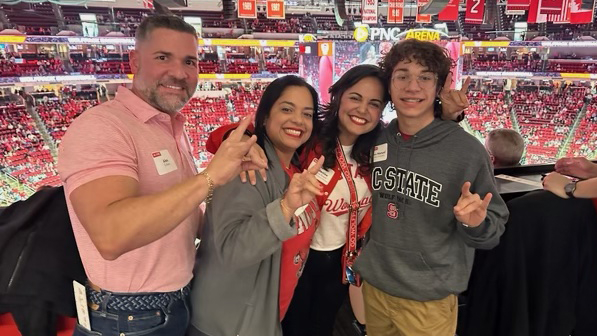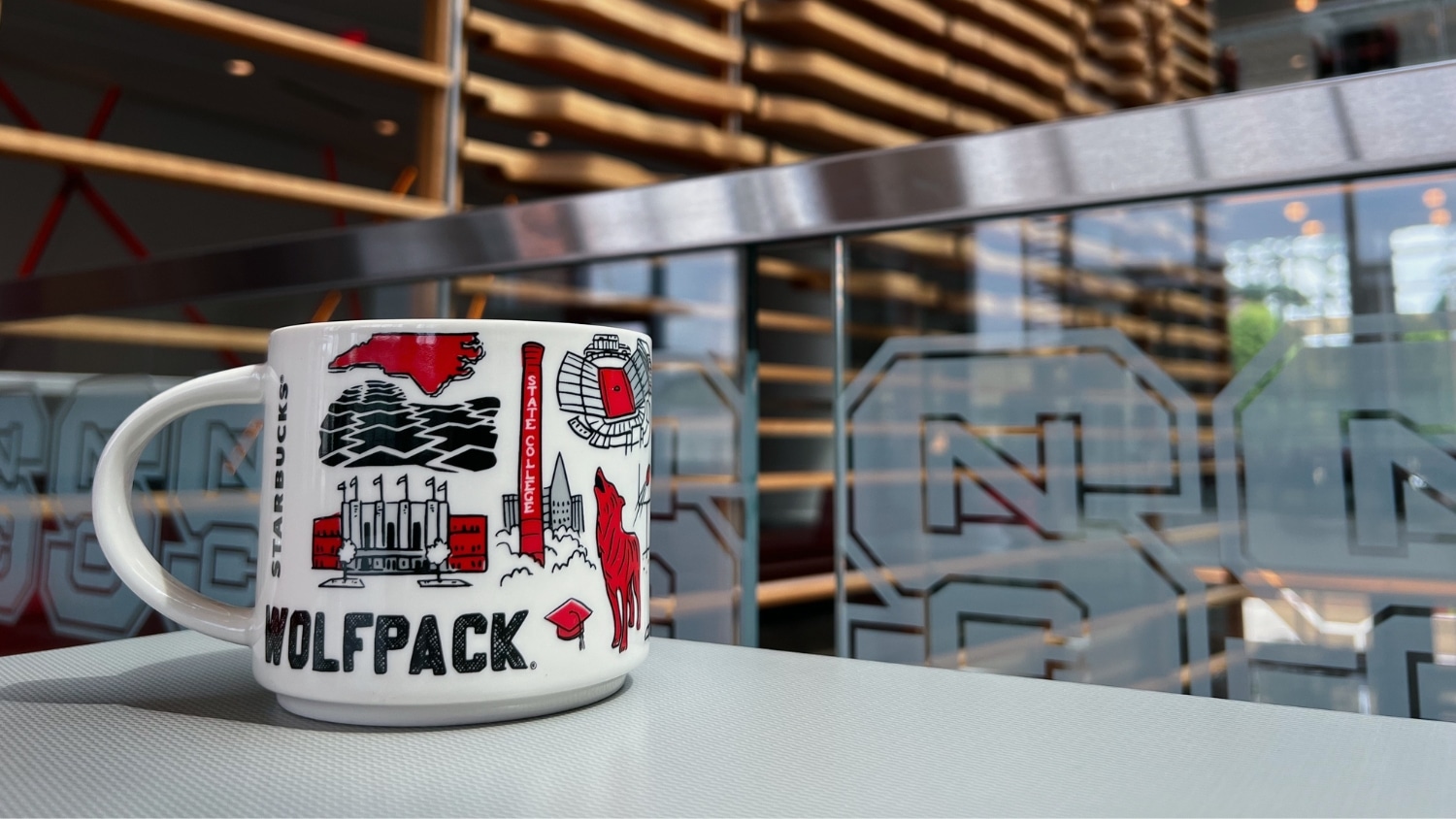Spring Connect: Starting Strong in Prague
NC State offers Spring Connect students the chance to begin their college career — and challenge themselves — in Czechia.
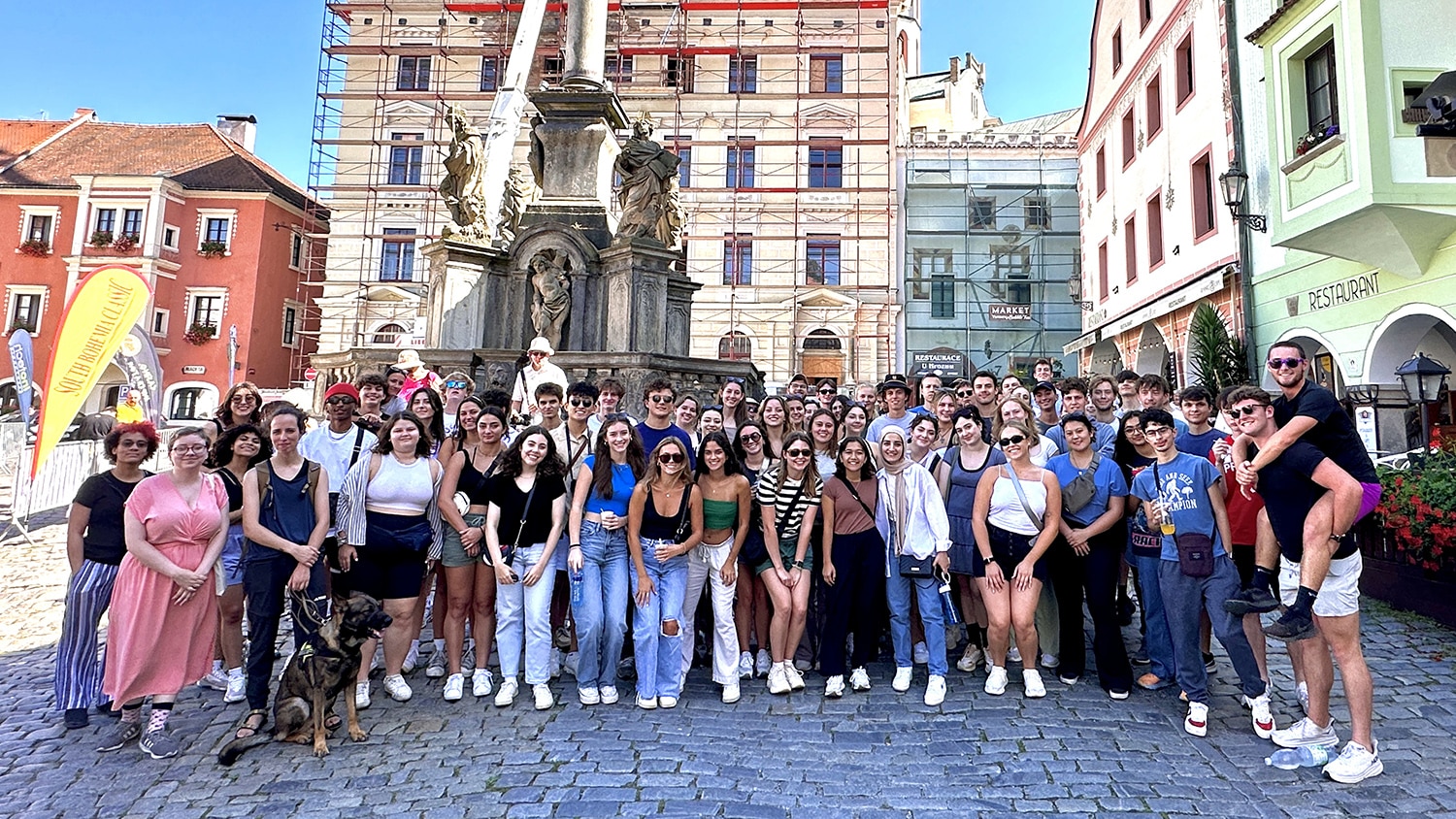
From their first day on campus, the first-year students at NC State’s European Center in Prague could easily ask for academic credits in courage, culture and calculus.
Courage for the bold step in starting their college careers 4,500 miles from Raleigh, North Carolina.
Culture for jumping into the heart of a medieval central European city with a complicated modern history.
And advanced calculus for navigating a public transportation system of buses, Metro trains, tram cars and walking streets — all using the Czech language’s consonant-heavy, 42-character alphabet — that are unlike anything any North Carolina city or town has to offer.
The semester-long program, a relatively new addition to NC State’s well-established semester- and summer-long study abroad programs, is now more than five years old and has served as the introduction to college for nearly 200 students in its five cohorts.
It’s a very bold thing to do — and a little scary.
The program is open to Spring Connect students, those who have been accepted to NC State but don’t begin their on-campus experience until the spring semester following their high school graduation. Many students in that situation work for a semester, go to a local community college for credit hours or find other adventures before enrolling in January.
Since 2017, however, NC State has offered 36 students every fall the opportunity to begin their college careers in Czechia (more widely known in English as the Czech Republic).
“Study abroad is something I knew I wanted to do, but I hadn’t thought about going to Prague,” says Keilea Yannotti, a first-year student from Fayetteville. “I didn’t even know I could until my mom got an email and showed it to me.
“It’s a very bold thing to do — and a little scary.”
It’s the good kind of fear, of course, the anticipatory kind that all college students have about their first days of class, their new friendships and their independent steps into adulthood.
It just happens to be six time (and infinite comfort) zones away for the students, many of whom have never taken a flight by themselves or traveled internationally.
“I’ve always struggled some with anxiety, and that’s something that affected my mentality toward committing to the Connect program,” says Avery Kimball, a 2023 graduate of Raleigh’s Enloe High School. “Being part of a community here has really helped me navigate that.
“Originally, I didn’t get admitted to NC State for the fall semester, and it threw me for a loop with my anxiety. Then I found this program, and I said, ‘Oh, yeah, that’s what I want to do.’ Even when I got an email saying there was a spot for me in the fall class, I knew I was going to come here.”
The European Center has a partnership with a local mental health agency with several counselors for students who might be struggling with adapting to life in a different culture and environment.
The program is something near to Chancellor Randy Woodson’s heart — not only because one of his children studied in a European Center program for upperclassmen, but because of the impact international study has made on even the youngest NC State students.
“I was very focused on graduating and did not study abroad when I was in college,” says the native of rural Arkansas who became a plant scientist, a provost and a chancellor. “Through the years, however, I saw the amazing benefits of international programs like the ones we offer.”
In recent years, nearly 20% of NC State students have some sort of international study experience, from full semester, Maymester and summer programs to week-long Alternative Service Break options. The university has exchange programs with schools around the globe and affiliate programs, all part of NC State’s Office of Global Engagement.
Its primary offering, however, is NC State’s European Center in the medieval city of Prague, capital of the modern Czechia, historic capital of Bohemia, birthplace of the Protestant Reformation and the internationally acclaimed “City of Spires,” named for the dozens of ornate peaks that define its red-roof skyline.
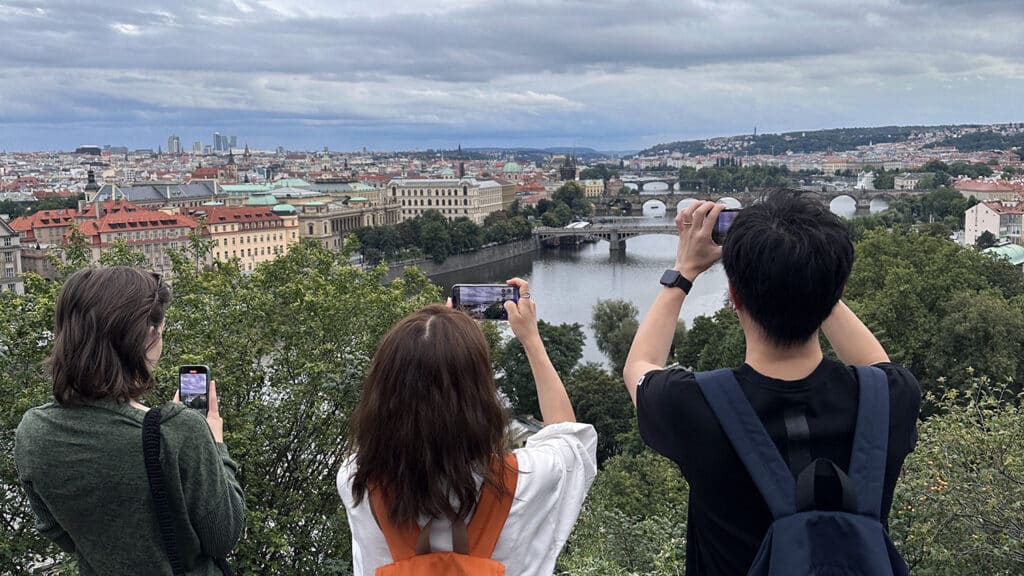
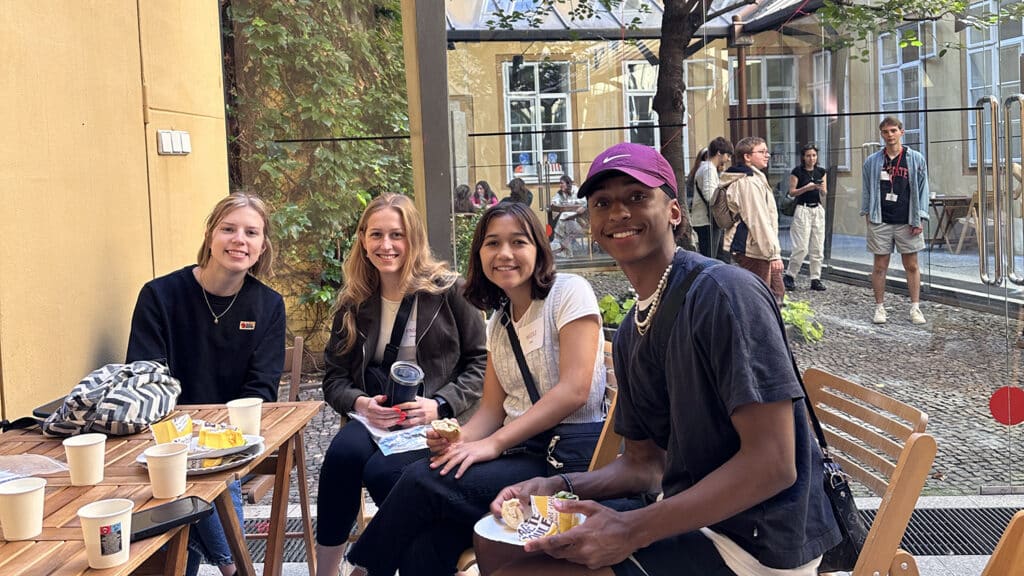
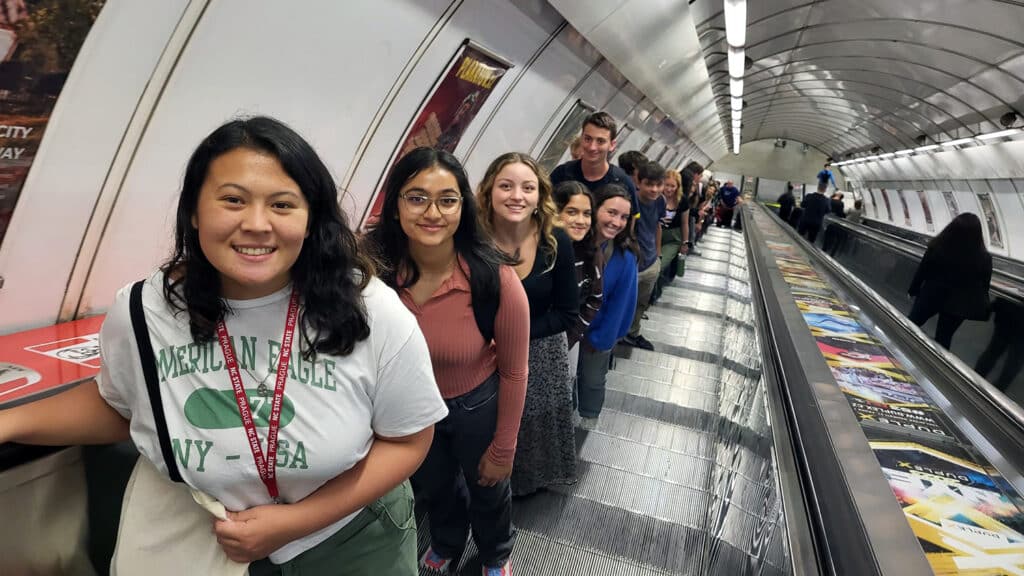
NC State’s campus consists of a four-story building that shares a Swarovski jewelry store on the ground level, connected to the Czech Republic’s only Hard Rock Cafe.
It’s all in Old Town Square, a UNESCO World Heritage site where tourists begin lining up — ahem, “queueing” — around 9 a.m. daily for a one-minute display of the Prague Orloj, the world’s oldest functioning astronomical clock that was originally built in 1410 and features wooden carvings of the 12 apostles.
When Woodson visited last summer for the first time since the grand opening of the full center, he stayed at a hotel just a few steps away from a restaurant that brags, “Probably the Best Hamburgers and Hotdogs In Town.”
It’s a city that fully embraces its past but is not above welcoming new additions to the landscape. Last November, the biggest event prior to the celebration of the country’s break from Soviet Union influence was the opening of a Popeyes fast-food restaurant across the street from KFC on Wenceslas Square.
Students in NC State’s “Classic” programs take classes in various disciplines. The university’s presence in Prague originated in 1992 as part of a College of Design summer program and evolved into a year-round program in 2005. It expanded several times over the years and opened its doors to students from all colleges in 2017.
Approximately 250 students are enrolled for fall, summer and spring semesters, with room to grow. There have even been students from other UNC System schools like East Carolina and UNC Charlotte. In recent years, the European Center has established a partnership with UNC-Chapel Hill and hosts its students in fall, spring and summer terms.
The Prague Connect program, however, is for first-semester or transfer students only.
“They are a special group,” says center director Kim Strozewski, an Ohio native who has lived in Prague with her Czech-native husband for 20 years. “It’s not just that they have never been on a plane before — it’s that they are 18 years old, and many have never had to do their own laundry, to cook for themselves or so many other things that first-year students experience for the first time.
“Those are the students, however, who show the most growth because they go from 0 to 100 miles an hour overnight. We see them come back over here for other programs after they get settled at NC State.”
We see them come back over here for other programs after they get settled at NC State.
The European Center offers a summer internship program and courses for a Global Leadership minor.
Prague Connect students have two academic tracks of study to choose from, both approved by NC State. One track includes classes in physics, sociology, the political science of European politics and an introductory Czech language class. There is also a science track that includes biology and life sciences, some in conjunction with the city’s Charles University, Prague University of Life Sciences and other specialized Czech institutions.
Lenka Davisonová, a native of Czechia who married a U.S.-born Peace Corps volunteer just after 1989’s nonviolent Velvet Revolution, is a language specialist who helps teach the introductory Czech course.
“There is no way to fully teach Czech, and there is no second-semester class offered at NC State,” she says. “But it is important for the students to learn and recognize parts of the language, and Czech natives appreciate them trying to use the language when they can.”
Because of their country’s history as a political kickball over the last century, natives of Prague have been known to be reluctant to engage with foreign visitors. They don’t always smile when passing on the streets, they keep a low profile on the Metro and they don’t appreciate loud voices in public places.
They do acknowledge a visitor’s valiant effort to say “dobrý den” (hello), “děkuji” (thank you), “omlouvám se” (excuse me) and the extremely useful “nemluvím česky” (I don’t speak Czech). Opening doors for someone is a little odd, but giving up a seat to elderly people, pregnant women or children traveling alone is customary for all Prague natives.
Food can be a challenge for American students, especially those with specific dietary needs, but the language classes help with that.
“Definitely the most eye-opening thing for me has been the food,” says second-generation NC State student Pranali Patel of Cary. “My family has always been vegetarian, and coming to a different country, I didn’t know how that would go for me.
“But early on in our Czech language class, we covered food vocabulary, and I was able to memorize everything I needed to know.”
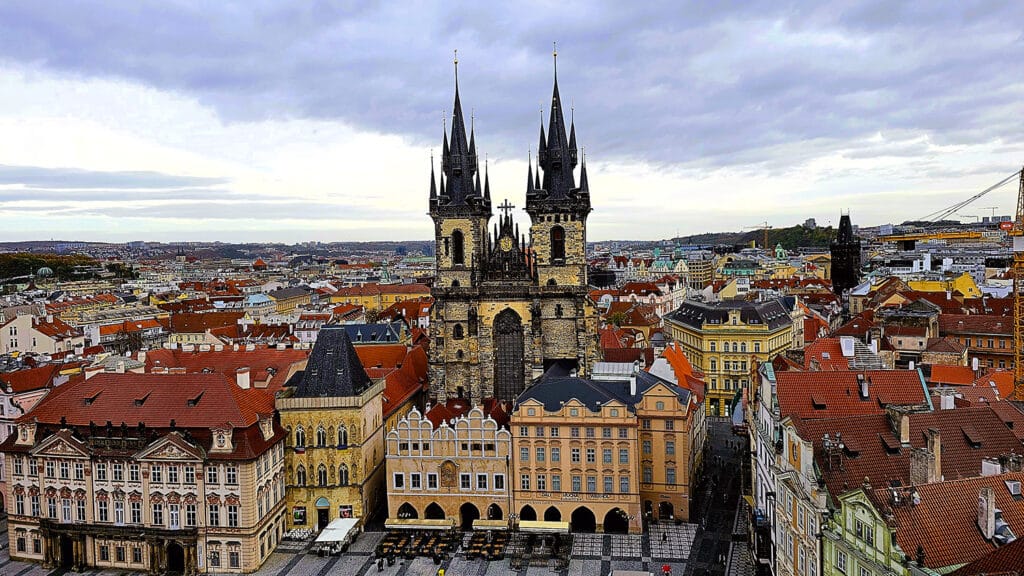
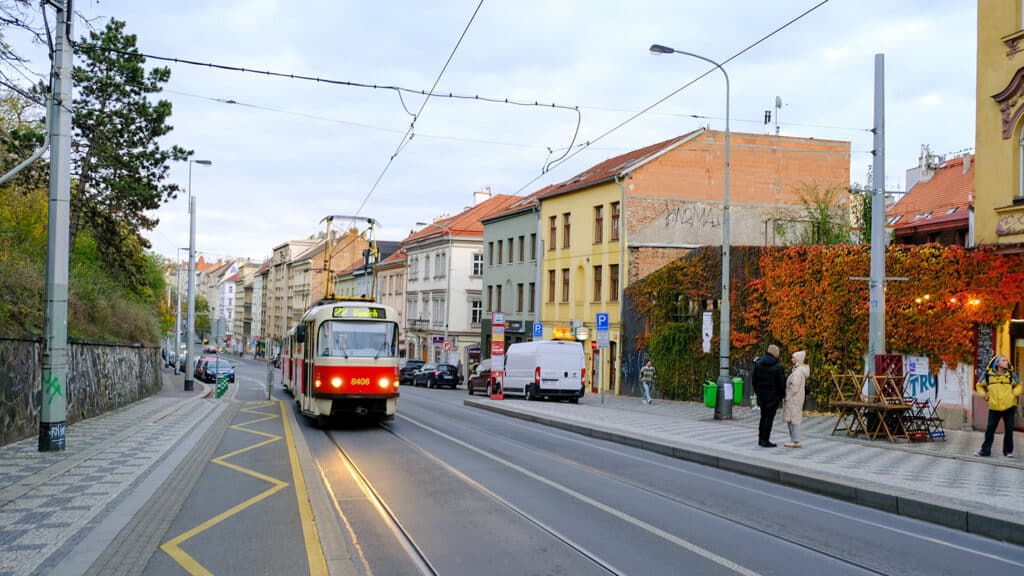
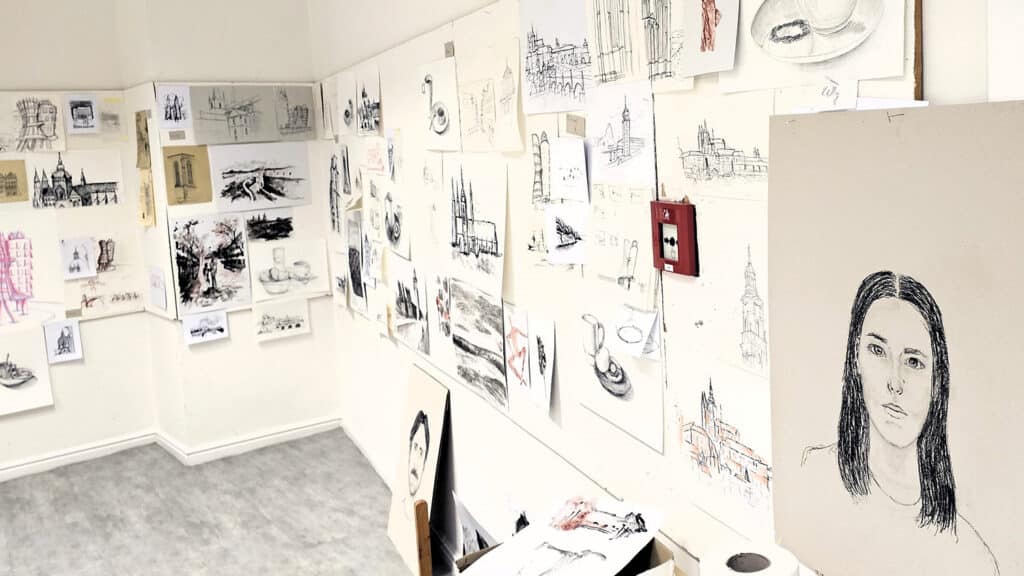
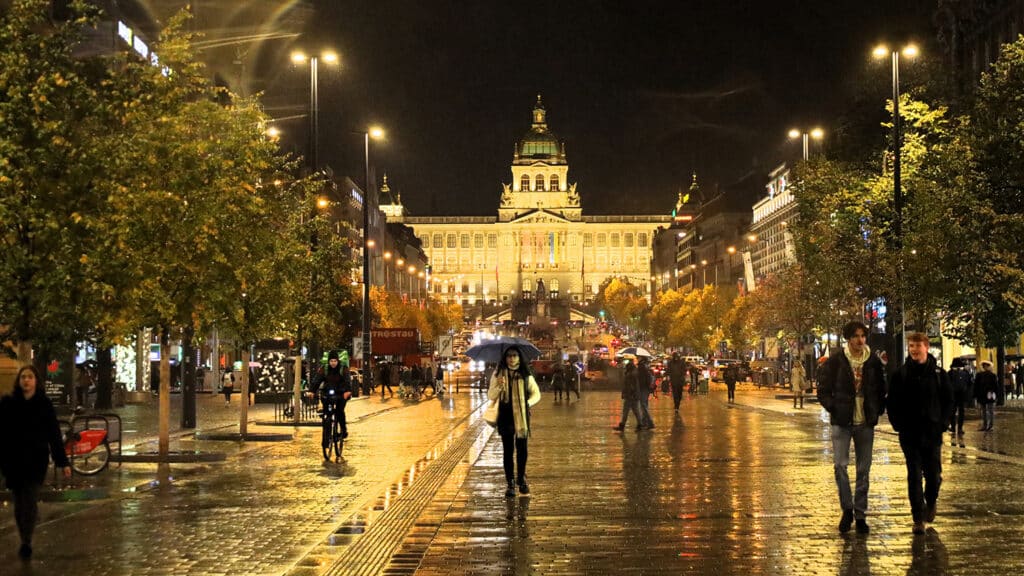
Prague offers multiple cultural opportunities, including a network of contemporary and traditional art museums, two historical sites devoted to the country’s history with the Cold War and communism, a newly opened beer museum and a Center-sponsored bonding getaway to Cesky Krumlov, a UNESCO Heritage site. (That doesn’t even take into account the ample opportunities for self-travel to Europe’s grandest destinations like Venice, Paris, London, Berlin, Copenhagen or Budapest.)
Midway through the semester, students take an eight-hour bus trip from the city to Krakow, Poland, led by administrators and Polish-born professor Ewa Grigar. It’s a mandatory five-day trip that includes a somber visit to the Auschwitz-Birkenau State Museum.
Classes begin in September, with ground transportation mayhem to follow. Fortunately, Prague is a safe and walkable city, even at night.
Students are paired with roommates in an off-site four-story apartment building about 2 miles from campus, with easy daily access by tram. On each floor, a Czech student in the same age range employed by the European Center lives among the college students to help them acclimate to their new city.
For nearly 20 years, the center’s facilities have been tended by its longest-serving employee, Anna Šedová, a native of Prague who has progressively served as mom and grandmother to students thousands of miles from home. Despite the language barrier, she is quick to share her compassionate heart and sympathetic ear.
There is much to learn, only some of it in the classroom. Homesickness wanders in every now and then, like a Vltava River fog rolling under the Charles Bridge, and some local customs are never truly accepted. Ask students what they miss most about home and they invariably say “my family,” “my dog” or “my bed.”
But not always.
“The refills, definitely the refills,” one student said.
It’s true: American kids who grew up on unlimited iced tea, generous additional baskets of tortilla chips and a free glass of ice water with every meal need time to adjust to a more spartan Czech existence, where the meals are heavy with meat, dumplings and gravy, and the glasses are small and quickly emptied.
After a week or two, most students learn their way around and how to correct any mistakes as they make their way to class.
“That’s the beauty of it,” Kimball says. “You get on a tram or on the Metro, and you think you are going one place and you end up somewhere else. Because we learn some of the bare basics of Czech, it doesn’t take too, too long to learn to read the signs and find your way around.
“You have to get lost a little bit to be able to find your way.”
And, in that regard, Prague Connect students have the same college experience as most first-year students, whether in the Old North State or Bohemia.
- Categories:
